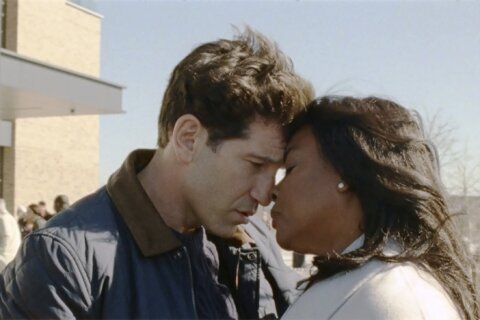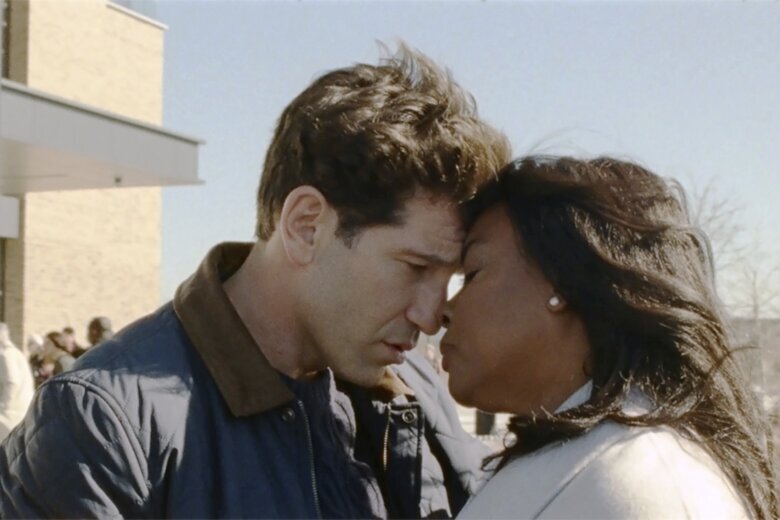
In her biopic “Selma” (2014), she depicted Martin Luther King Jr.’s quest to pass the Voting Rights Act. In her documentary “13th” (2016), she chronicled institutional racism in the U.S. prison system. And in her miniseries “When They See Us” (2019), she defended the falsely accused Central Park Five.
Now, Ava DuVernay delivers her magnum opus “Origin,” which opened in movie theaters nationwide over the weekend just before Oscar nominations are announced on Tuesday (more on that release strategy later).
Based on the 2020 book “Caste: The Origins of Our Discontents,” the film follows author and scholar Isabel Wilkerson as she brainstorms her next book idea after the success of “The Warmth of Other Suns: The Epic Story of America’s Great Migration.” As the first Black journalist to win the Pulitzer Prize for journalism, she embarks on her most ambitious project yet: a book linking racism in the U.S. to a larger global concept of the caste system.
Wilkerson is warmly portrayed by Aunjanue Ellis-Taylor (Oscar nominee, “King Richard”) with deeply human interactions, including an interracial marriage to her loving husband (Jon Bernthal), her ailing mom (Emily Yancy) and confiding cousin (Niecy Nash-Betts). She even has personable interactions with a plumber (Nick Offerman) wearing a red “MAGA” hat as she remodels her home in an allegory for repairing cracks in America’s foundation.
DuVernay opens the film with the 2012 killing of 17-year-old Trayvon Martin (played by Maryland native and Broadway Tony winner Myles Frost) by Florida neighborhood watchman George Zimmerman, who stalked the hooded teen despite police dispatchers telling him not to tail him. The way DuVernay films the scene, we know we’re in the hands of a filmmaking force, capturing window reflections and ominously showing a pack of Skittles.
She next shows Wilkerson traveling to Germany to visit the sites of former concentration camps before having dinner-table conversations comparing and contrasting the experiences of Jews in Germany during the Holocaust and Black folks in America during slavery. Here, the script is smartly written to draw vital parallels, but also where Wilkerson commits unforced errors, lamenting her regrets in a phone call after dinner for key character growth.
Finally, Wilkerson visits India for the film’s most educational moment teaching audiences about the Dalits, the “untouchable” lowest class in a nation ironically founded by a Dalit man, B.R. Ambedkar, who wrote the Indian Constitution and yearned to abolish the caste system. DuVernay repeatedly shows a symbolic statue of Ambedkar, while playing audio of MLK’s 1959 visit to India, relating his own Civil Rights Movement to the Dalit struggle.
It’s super ambitious to try to tie historical and current events across different nations together into one cohesive story, but our reach should always exceed our grasp. The film won’t work for everyone, especially if you favor a traditional narrative structure, but I was on the film’s wavelength the entire time, admiring the ambitious thesis as DuVernay’s magnum opus, combining the best of her skills both narrative (“Selma”) and documentary (“13th”).
Of course, we have to address the elephant in the room that “Origin” will be slammed by Rotten Tomatoes review bombers who don’t share the film’s political views. If you share the mindset of recent political candidates that racism never existed in America and can’t admit that slavery caused the Civil War, this movie isn’t for you. This is a film for open hearts and minds hoping to grow, learn and change to make America live up to its original promise.
It’s a shame that the film is being released so late. DuVernay is an awesome director consistently let down by a baffling release strategy. “Selma” was an instant classic destined to be shown in schools for decades, but the various guild screeners weren’t sent out in time, meaning many voters didn’t see it until it opened nationwide on Jan. 9. Thus, it earned a Best Picture nomination but missed for David Oyelowo as MLK and DuVernay as director.
Similarly, “Origin” just arrived last Friday, Jan. 19 after Oscar voting had already ended Jan. 16. Perhaps it’s following the strategy of “One Night in Miami” (2020) releasing Jan. 8 and “Judas and the Black Messiah” (2021) releasing Feb. 12, but I’m seeing less momentum from awards pundits. Local critics who saw it at the Middleburg Film Festival have been raving about it since October — I watched it on a Neon awards screener over the holidays — but I’ve had to hold my review until now when our WTOP listeners can actually see the movie here in D.C.
The fact that I can so vividly remember so much of “Origin” this many weeks after seeing it says a lot about the film’s power. And yet, I still think an October release like “13th” would have kept it in the awards conversation (“13th” would have won an Oscar that year if not for “O.J.: Made in America” being incorrectly classified in a movie category instead of the episodic television event that it was, a rule that was changed immediately afterwards).
Surely, Ellis-Taylor deserves a nomination for Best Actress, Bernthal deserves a nomination for Supporting Actor and DuVernay deserves nominations for Best Director and Best Adapted Screenplay, but I have a feeling that “Origin” will be snubbed in most every category when Oscar nominations are announced on Tuesday morning. Voters can’t vote on what they barely have time to see, an unfortunate self-fulfilling prophecy of snubbing.
The reaction to this is predictable. Left-leaning cinephiles will say it’s proof that the Academy is biased, while right-leaning detractors will insist that the movie just wasn’t good enough — which isn’t the case at all. “Origin” is a thoughtful, thought-provoking, award-worthy film that is a fascinating companion piece to “American Fiction.”
Get breaking news and daily headlines delivered to your email inbox by signing up here.
© 2024 WTOP. All Rights Reserved. This website is not intended for users located within the European Economic Area.








